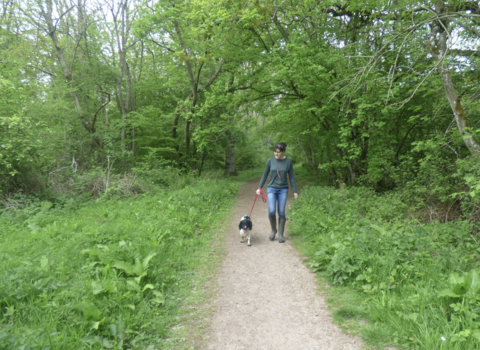The Wildlife Trusts are urging dog owners to keep pets on short leads now that spring is here – birds will be nesting on the ground, species are emerging from hibernation, and new born lambs and grazing livestock are out on nature reserves.
Experts say that dogs off leads are one of the biggest causes of wildlife disturbance – this is particularly problematic when many species are breeding and vulnerable either on or near the ground. Ground-nesting birds such as curlew, corn bunting and skylark are particularly at risk: 66% of ground-nesting birds are in decline in the UK, compared to 31% of other species.
Dogs pose a threat to sheep, cows and other grazing livestock, with problems regularly reported on Wildlife Trust land - many of The Wildlife Trusts’ 2,400 nature reserves welcome responsible dog walkers but instances of loose dogs disturbing wildlife and livestock have led the charities to issue a plea ahead of spring.
Dog owners can help wildlife:
- Keep dogs on short leads on nature reserves and the wider countryside
- Clean up after animals and dispose of dog waste in bins or at home
- Avoid using nature reserves if walking large groups of dogs
The impacts of dogs off leads in wild places include trampling nests and scaring adults away from their young; vulnerable chicks can perish if left alone for too long. Disturbances can also affect feeding and foraging behaviour – wildlife is less likely to breed and feed in areas where dogs are encountered. Across the country Wildlife Trusts have reported multiple problems with dogs chasing grazing livestock, which has resulted in the deaths of animals.
Nik Shelton, BCN head of communications says: “The biggest issue at the moment is owners not in control of their dogs. There have been several attacks on sheep at our Pegsdon nature reserve in January in which one died as a result. We had to close another reserve because people were letting their dogs off the lead in areas where livestock were present. We need people to understand that they must keep their dogs on a lead and under control for the sake of wildlife, other people and livestock.”
Joan Edwards, director of policy for The Wildlife Trusts says: “It’s great that so many people benefit from enjoying beautiful natural areas while out walking their dogs, but we urge responsibility. Wildlife is suffering huge declines and dogs in wild places can cause problems, especially from February through to the end of summer when many species are breeding. I’m a dog owner but never walk her without a lead during nesting season. It’s not only the impact on ground-nesting birds, but other wildlife including amphibians and mammals can be affected, as well as grazing livestock.”
Jenna Kiddie, head of canine behaviour at Dogs Trust says: “A countryside dog walk is understandably popular, especially as we move into the warmer months. But owners have a responsibility to keep their dog under control, including around livestock and wildlife, to ensure they do not worry other animals or stray onto neighbouring land for everyone’s safety and wellbeing.
“This can be managed by ensuring dogs are kept on a short lead, and close to their owners, whenever livestock are nearby, within seeing, hearing or smelling distance or whenever their presence is likely to be expected. It is important to remember that chasing is normal dog behaviour, and that any dog is capable of chasing, irrelevant of breed, type, age or size.”
The Countryside Code outlines that dogs must be controlled to avoid disturbing farm animals or wildlife. Farmers are, by law, entitled to destroy a dog that injures or worries their animals, and the law states that you must keep your dog on a lead no longer than two metres between 1 March and 31 July when on any open access land to protect ground-nesting birds.
Jenna Kiddie, Head of Canine Behaviour at Dogs Trust: “Training has a crucial role to play and at Dog School we teach owners how to ensure their dog walks nicely on their lead around distractions – such as the sights, smells and sounds of other animals. We would encourage dog owners to visit our Dog School website for more information on training techniques, or to book onto training classes.
“For dog owners living in rural areas, we emphasise the importance of habituating young puppies to livestock. This should be done gradually and considerately so the dog and livestock alike are able to feel positively and safe in close proximity to each other, again with the dog always on a lead and under control. As a responsible dog owner, you can also ensure that everyone is able to enjoy countryside walks and protect wildlife by ensuring you pick up after your dog and dispose of dog waste appropriately.”

